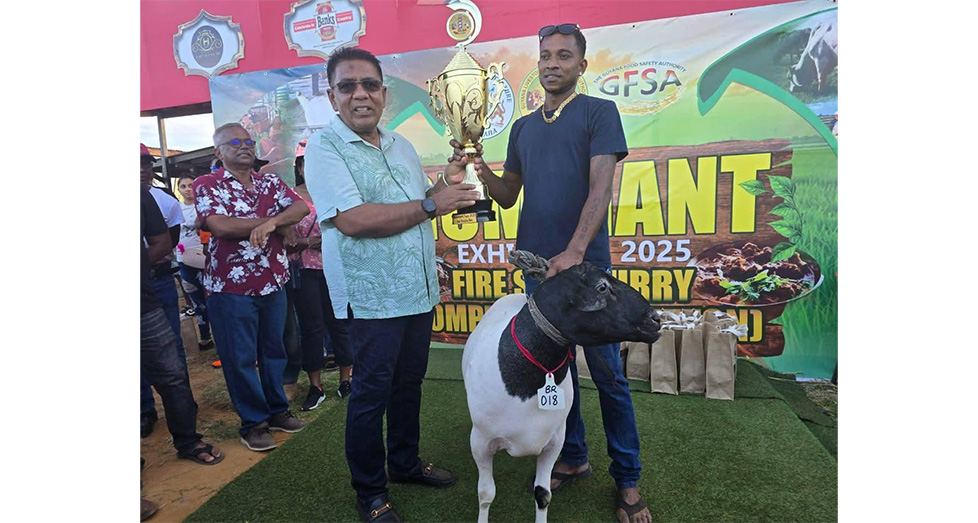Young Farmer Elevates Sheep Farming in Guyana
WHEN Marlon Fraser was just 12 years old, his world changed dramatically. The passing of his father meant that the young boy from Martyrsville, Mon Repos, had to shoulder full responsibility for his family’s small farm.
But what could have ended a childhood instead became the beginning of a remarkable journey—one that has seen him rise as a promising leader in Guyana’s small ruminant industry.
“My father was my teacher,” Marlon recalled, reflecting on long days spent tending to Barbados blackbelly sheep and helping in the family’s fruit orchard. “Everything I know started from those lessons at home.”

Taking over the reins so young wasn’t easy. But with determination and a clear vision, Marlon transformed tragedy into purpose. One of his main goals after his father’s death was to improve the genetics of his flock, creating animals that could meet the growing demand for better breeding stock and higher-quality meat.
He has deep respect for the Barbados blackbelly, a native breed known for its adaptability, long body, and excellent mothering ability. “The blackbelly is an amazing breed,” he explained. “It’s prolific and well-suited for our climate. When bred with other high-performing breeds, the results are exceptional.”
That philosophy guided Marlon’s next steps. His turning point came when a fellow breeder gifted him a Katahdin-Dorper crossbred lamb—a gesture that would forever change his flock’s future. “That lamb marked the start of my genetic improvement programme,” he said proudly.
With the support and technical guidance of the Guyana Livestock Development Authority (GLDA), Marlon began incorporating Dorper and Katahdin genetics into his flock. These breeds, imported through GLDA initiatives, have been key to boosting meat production and overall flock performance nationwide.
Today, Marlon manages about 50 sheep at his home in Martyrsville, housed in an elevated pen system that keeps the animals safe and healthy. With no open grazing space, he uses a cut-and-carry feeding method, supplementing with store-bought feed to maintain balanced nutrition. He also runs a fruit farm at Enterprise backlands, balancing both operations with discipline and care.
Over the years, his partnership with GLDA has proven invaluable. “The extension staff visit often, guiding us in feeding, nutrition, and genetics,” Marlon shared. “The Region Four team, led by Ms. Ava Klass, and my area Livestock Extension Officers, Lydia Gopaul and Ronaldo Pancham, have been instrumental. With their help, I’ve learned how important record-keeping is—traceability is really the lifeline of my operation. All my animals are tagged and separated to prevent inbreeding.”
Marlon also spoke highly of GLDA’s strict monitoring and quarantine procedures, which he admits he didn’t always appreciate as a younger farmer. “At first, I used to be impatient with all the rules, paperwork, and quarantining when importing animals,” he said with a laugh. “But now I understand—it’s about protecting our industry. The GLDA team, including Dr Walrond, the CEO, is always ready to advise us on the right steps. That level of support is something I truly value.”
He believes this partnership between the government and farmers is a model of success. “It’s a real public-private partnership,” he emphasised. “Because of GLDA’s work to import quality breeding stock, farmers like me now have more choices. We’re better equipped to meet market demand, especially with the oil and gas sector expanding and people having more disposable income for quality food.”
While the cost of intensive sheep farming can be high, Marlon said the returns make it worthwhile. His target each year includes three rounds of breeding animal sales and an average of twelve rams per month for slaughter. “It’s hard work, but it pays off,” he said with a satisfied smile.
His dedication recently earned national recognition when he took first place in the Small Ruminant Expo at the Rising Sun Turf Club in Weldaad, representing Region Four. The competition brought together farmers from across Guyana, showcasing the country’s growing livestock excellence.
Looking ahead, Marlon is focused on expanding his flock to meet rising market demand while continuing to raise the bar on quality and efficiency. “This journey has taught me patience, discipline, and the value of support,” he said. “With the right guidance and a clear plan, young farmers like me can help strengthen Guyana’s food security and build a stronger livestock industry.”
From a young boy managing his late father’s flock to a recognised champion in small ruminant farming, Marlon Fraser’s story is one of resilience, innovation, and hope—a reminder that with passion and perseverance, even the smallest farms can achieve extraordinary growth.



.jpg)








